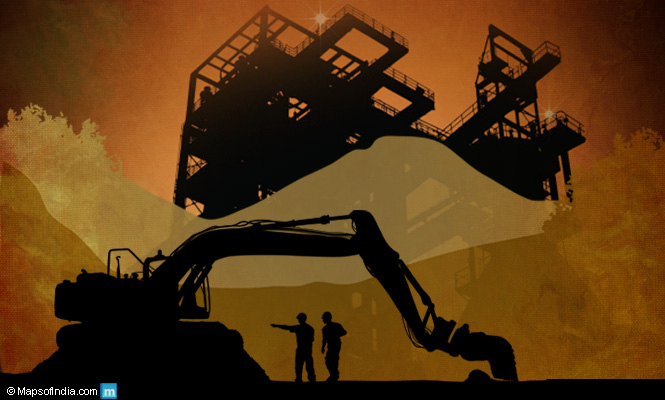 In its century old glorious history, Tata Steel has ventured out for the first time to buy iron ore. Facing an acute shortage of iron ore over the past few months, the steel giant decided to source raw material for its 9.7 million tonne per year manufacturing facility in Jamshedpur, Jharkhand, both indigenously and through iron ore imports.
In its century old glorious history, Tata Steel has ventured out for the first time to buy iron ore. Facing an acute shortage of iron ore over the past few months, the steel giant decided to source raw material for its 9.7 million tonne per year manufacturing facility in Jamshedpur, Jharkhand, both indigenously and through iron ore imports.
The Katamati iron ore mine and the Joda East iron ore mine in the Keonjhar district of Odisha had been operated under a lease by the OMQ (Ores, Mines, and Quarries) department of Tata Steel for many decades now. These two mines alone supplied the necessary raw material for over 65 percent of the company’s production – about 17 million tonnes of iron ore. Following the expiry of statutory clearances, the State Government of Odisha recently suspended these licences. In Jharkhand, Tata Steel was sourcing iron ore from the Noamundi mines of West Singhbhum district. This too was recently shut down. The Jharkhand mines yielded about 3-5 million tonnes of ore. The loss of these mines has forced Tata Steel to purchase iron ore on a daily basis.
Why were the iron ore mines shut down?
The closure of the iron ore mines that fed Tata Steel’s Jamshedpur plant followed a July 18 directive issued by the Union Ministry of Mines, amending the Mineral Concession Rules 1960. The directive limited the extensions on all mine leases unless the renewal of these leases is done and the deeds executed. A subsequent amendment added that the leaseholders would have a two- year window to execute the deemed renewal for the first time. This amendment was taken by the State Governments to mean that this two-year period will not be available for any of the subsequent renewals.
The decision led to the shutdown of 12 iron ore mines in Jharkhand, including Noamundi and the Gua mines used by SAIL to source iron ore, in the month of September. As of November 2014, Tata Steel had petitioned to the High Court of Jharkhand seeking renewal of the lease and the matter is pending before the State High Court. The Government of Jharkhand has told the court that the leases would be renewed but this has not been completed yet.
Who supplies Tata Steel iron ore now?
Tata Steel is now depending on the supply of iron ore from the State-run National Mineral Development Corporation (NMDC) and on its imports from Australia. The steel manufacturing giant is believed to have already bought 0.8 million tonnes of iron ore from NMDC and is continuing to buy on a daily basis. This procurement is likely to have a disastrous effect on the costs.
Tata Steel is not the only steel manufacturer in the country to be hit by the crisis. JSW Steel, another leading manufacturer, has also fallen back on iron ore imports to keep its supply steady. The import figures for JSW Steel has already reached the 0.5 million tonnes a month figure.
Tata Steel is, however, confident that its iron ore scarcity woes shall be short-lived. It hopes that the court verdict will be in its favour and the mines will once again become operational. With the renewal of leases and with mining back on the track, the company hopes to stop the purchase and import of iron ore and cut down on its operational costs. Import of iron ore on a large scale is also an undue burden on the country’s much pressured current account with the Finance Ministry trying hard to bridge the deficit gap.
Tata Steel – A profile
Tata Steel was established in 1907 as one of Asia’s earliest private steel manufacturing companies. With operational centres in about 26 countries, it is also a Fortune 500 company with a turnover of INR 1,48,614 crore and employs about 80,000 people worldwide. Tata Steel produces over 29 million tonnes of crude steel every year. Apart from India, Tata Steel has steel manufacturing units in Australia, China, the Netherlands, Singapore, Thailand and the UK.
In India, the company established the country’s first integrated steel plant in the city of Jamshedpur. It is the country’s largest steel producer in terms of its market value. The company has registered its commercial presence in almost 50 countries across the globe. It strives to set the benchmark in the world’s steel industry and to be the market leader in the Asia Pacific region.
As of December 9, 2014, Tata Steel’s shares were trading at INR 436.10 at the BSE with a 52-week high of 578.60 and a low of 332.20 and a Market Cap of INR 42,354.70 crore. The steel giant declared a net profit up 37 percent in Q2 of 2014-15 based on a one-off gain from a land sale. The consolidated net profit declared for the quarter was INR 12.54 billion rupees – up from 9.17 billion rupees in the same quarter last year.



